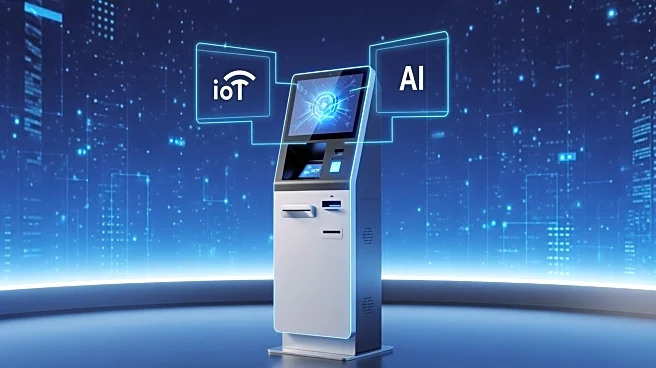What's Happening?
The global self-service kiosk market is undergoing a significant transformation, with projections indicating growth from USD 14.63 billion in 2025 to USD 39.71 billion by 2035. This expansion is driven by the increasing adoption of automation and digital
solutions across various sectors, including retail, transportation, healthcare, and hospitality. The integration of Artificial Intelligence (AI) and Internet of Things (IoT) technologies is enhancing customer engagement and operational efficiency. North America leads the market, with Europe and Asia Pacific also showing strong growth due to digital transformation initiatives and urbanization. The retail sector dominates the market, utilizing kiosks for self-checkout and personalized promotions.
Why It's Important?
The growth of the self-service kiosk market is significant for several industries, as it represents a shift towards more efficient and customer-friendly service models. The integration of AI and IoT allows businesses to offer personalized experiences, which can lead to increased customer satisfaction and loyalty. This trend is particularly important for the retail and hospitality sectors, where customer experience is a key differentiator. Additionally, the focus on sustainability and energy-efficient designs aligns with global environmental goals, potentially influencing purchasing decisions and corporate strategies. Companies investing in these technologies may gain a competitive edge in the evolving market landscape.
What's Next?
As the market continues to grow, businesses are likely to increase their investment in AI and IoT technologies to enhance their service offerings. The focus on sustainability will also drive innovation in kiosk design, with companies developing eco-friendly models. Major players in the market, such as Zebra Technologies and NCR Corporation, are expected to continue expanding their product portfolios and forming strategic partnerships to capture market share. The ongoing digital transformation across industries will likely accelerate the adoption of self-service kiosks, further driving market growth.
Beyond the Headlines
The integration of AI and IoT in self-service kiosks raises important considerations around data privacy and security. As these technologies collect and analyze customer data to provide personalized experiences, businesses must ensure robust data protection measures are in place. Additionally, the shift towards automation may impact employment in sectors heavily reliant on customer service roles, prompting discussions around workforce reskilling and adaptation. The emphasis on sustainability in kiosk design also reflects a broader trend towards environmentally responsible business practices, which could influence regulatory policies and consumer expectations.















